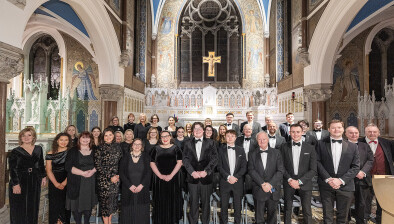NI High Court: Leave refused for challenge to cross-community voting mechanism

Northern Ireland’s High Court has refused leave to challenge by way of judicial review s.4(5) of the Northern Ireland Act 1988, which contains the mechanism for cross-community voting.

About this case:
- Citation:[2024] NIKB 67
- Judgment:
- Court:NI High Court
- Judge:Mr Justice David Scoffield
Delivering judgment for the High Court, Mr Justice David Scoffield stated: “The system adopted falls squarely within the broad margin of appreciation which, in my judgement, should properly be afforded to the state to seek to secure stable government in the unique circumstances of Northern Ireland.”
Ronan Lavery KC and Conan Fegan appeared for the applicant, instructed by McIvor Farrell Solicitors. Tony McGleenan KC and Philip McAteer appeared for the proposed respondent, instructed by the Crown Solicitor’s Office.
Background
The applicant, a British and Irish citizen, challenged s.4(5) of the Northern Ireland Act 1998 (NIA) which sets out the mechanism for cross-community voting in the Northern Ireland Assembly, on the basis that the voting rights of members of the legislative assembly (MLAs) who are not designated as Unionist or Nationalist carry less weight in important areas of Assembly business.
The applicant outlined that he is a voter for “Other” MLAs and wished to stand for election as an unaligned MLA, who would be automatically designated as “Other” in the event of being elected, but did not wish to be labelled as “Other” because of “negative and exclusionary connotations” of that word.
The applicant contended that only Unionist or Nationalist MLAs could exercise full voting rights in the Assembly, seeking declarations pursuant to s.4(2) of the Human Rights Act 1998 (HRA) that s.4(5) NIA is incompatible with his rights to stand for election or to vote under Article 3, First Protocol (A3P1) of the European Convention on Human Rights (ECHR) and/or is incompatible with his Article 14 ECHR rights in conjunction with his A3P1 rights.
The respondent, the Secretary of State for Northern Ireland (SSNI) contended inter alia that the application was premature as the applicant had not yet been elected and there was no election pending in which he was standing. The SSNI also asserted that had no locus standi to bring the claim.
The High Court
Mr Justice Scoffield began by setting out the relevant provisions of the NIA, highlighting the large number of matters requiring “cross-community” support such as the approval of the budget, votes of no confidence in ministers, the continuation of the Northern Ireland Protocol to the UK-EU Withdrawal Agreement.
The court also detailed inter alia the Assembly’s Standing Orders, Order 3A of which made provision for the automatic designation of an MLA as other where no other political designation was specified.
Locus standi
Mr Justice Scoffield noted the SSNI’s reliance upon R (Good Law Project) v The Prime Minister and Others [2022] EWHC 298 (Admin) as a “check” on the liberalisation in practice of the test for standing in judicial review.
The judge commented: “The rules as to standing are themselves a reflection of the public interest, operating (alongside other principles relevant to the discretionary nature of judicial review) to ensure that valuable court time is not wasted by applications which are unlikely to result in any concrete benefit to the litigants; and that important issues of public interest are argued by those well-placed to do so, rather than mere busybodies, publicity-seekers or agitators.”
Noting that the applicant mounted his case both as a putative MLA and as a voter for parties whose MLAs designate as “Other”, the court determined that the thrust of the respondent’s objection was that the intended challenge “is not a matter relevant to an election…but, rather, is a matter relevant to the working of the Assembly thereafter. The logic of the SSNI’s argument is that it is likely only to be elected MLAs who have standing to bring a challenge of the character the applicant seeks to mount.”
The applicant relied upon Sejdić v Bosnia and Herzegovina (2009) 28 BHRR 201, a case in which the ECtHR stated that it is open to applicants to contend that the law violates their rights “if they belong to a class of people who risk being directly affected by the legislation or if they are required either to modify their conduct or risk being prosecuted”.
The court outlined that the applicant had initially sworn that he wished to run for election again and was intending to do so, but that in a supplementary affidavit he indicated that he would not do so unless the designation regime was removed or modified (indicating that he had modified his conduct because of the provisions challenged). The court also pointed out that in his skeleton argument, the applicant contended that he “may not stand for election if the designation regime remains as is”.
Mr Justice Scoffield opined “the court was left in some doubt as to the applicant’s intentions and, regrettably, was faced with a lack of clarity in the applicant’s evidence overall about these… However, I am prepared to give the applicant the benefit of the doubt in relation to the question of standing insofar as he relies upon his status as a potential Assembly candidate.”
A3P1 ECHR
The court considered that A3P1 is considered to contain the right to stand for election and the right to vote in elections, both of which the applicant contended had been violated by the cross-community voting system.
The applicant suggested that in instances where cross-community voting is required, the votes of designated Nationalist and Unionist MLAs are counted twice: firstly in relation to the overall threshold required, and secondly in relation to the community designation thresholds. The applicant asserted that the votes of “Other” MLAs count only in relation to the overall threshold required, carrying considerably less weight.
Mr Justice Scoffield considered that the difficulty for the applicant is that there was nothing restricting him from standing for election, finding: “Even if the designation system could be said in some way to represent an impediment to the applicant standing for election, which the court does not accept, it would in any event not curtail the exercise of the applicant’s right to such an extent as to impair its very essence.”
On the issue of voting, the judge continued: “Again, the simple difficulty for the applicant is that the vote of each elector does have the possibility of affecting the composition of the legislature.”
Finding the respondent’s point that A3P1 did not create any obligation to introduce a specific system to be “extremely powerful”, the court determined that the applicant’s case as to the violation of his A3P1 rights was unarguable.
Article 14 ECHR
At the outset, the court indicated that the applicant’s Article 14 argument concerning discrimination against him was similarly unarguable since any justification for differential treatment is within the state’s margin of appreciation.
The applicant accepted that the introduction of a political system enjoying stability and sufficient support to bring the Troubles to an end represented the pursuit of a legitimate aim, but asserted that the same end could be achieved by means of a less intrusive measures.
Mr Justice Scoffield stated that it was not the court’s role “to redesign the legislative arrangements passed by Parliament and adopted by the Assembly, after agreement in the course of the Belfast Agreement and endorsement by referendum”.
The judge also pointed out that “the Assembly itself has mechanisms for reviewing the propriety of the cross-community voting arrangements”, noting that the facility for ongoing review of that issue was “another factor relevant to the establishing justification for the operation of the provisions”.
Conclusion
Accordingly, the High Court dismissed the application.
In the matter of an application by Raymond McCord for leave to apply for judicial review [2024] NIKB 67









